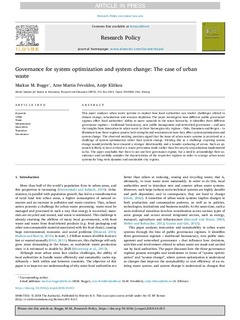Governance for system optimization and system change: The case of urban waste
Journal article, Peer reviewed
Published version

Åpne
Permanent lenke
http://hdl.handle.net/11250/2569467Utgivelsesdato
2018Metadata
Vis full innførselSamlinger
Originalversjon
10.1016/j.respol.2018.10.013Sammendrag
This paper analyses urban waste systems to explore how local authorities can resolve challenges related to climate change, urbanization and resource depletion. The paper investigates how different public governance regimes affect local authorities’ ability to move upwards in the waste hierarchy. It identifies three different governance regimes – traditional bureaucracy, new public management and networked governance – and uses the insights from innovation in urban waste in three Norwegian city regions – Oslo, Drammen and Bergen – to illuminate how these regimes possess both strengths and weaknesses in how they affect system optimization and system change. The observed working practices signal that the issue of urban waste systems is perceived as a challenge of system optimization rather than system change. Viewing this as a challenge requiring system change would probably have ensured a stronger directionality and a broader anchoring of actors. Such an approach is likely to have arrived at a waste prevention mode earlier than the step-by-step-solutions implemented so far. The paper concludes that there is not one best governance regime, but a need to acknowledge their co-existence and carefully consider the characteristics of the respective regimes in order to arrange urban waste systems for long-term dynamic and sustainable city regions.
